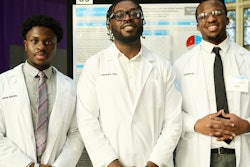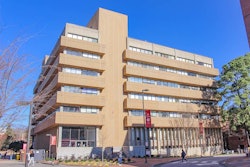By the time Edward Murray Jr. graduated from high school, he had witnessed a lot for his 18 years — the drowning of his niece and the demise of several family members who had succumbed to substance abuse and crime.
Murray, a recent University of Maryland alumnus and current U.S. Army officer, says the memories of his childhood led to his decision to pursue a career in public health.
The 33-year-old husband and father of five children, and now a public health administration graduate student at University of Maryland University College, says education allowed him to escape his crime-ridden Baltimore neighborhood. He has earned two bachelor’s degrees, one from the University of Maryland, Baltimore and the other from the University of Maryland, College Park.
“Education was my way out of the ghetto. If you get an education, that is your ticket,” says the recently promoted Army second lieutenant. “Many of the older neighborhood drug dealers would encourage me to finish school and pursue college.”
Early on Murray knew he wanted to go into the medical field. Like many African-American children during the 1980s, he was inspired by the long-running sitcom, “The Cosby Show,” and specifically by the main character, Dr. Heathcliff “Cliff” Huxtable, played by comedian Bill Cosby. He wanted to be an obstetrician-gynecologist just like the Cosby character.
“I took it like Bill Cosby was my father. I was one of the Cosby kids,” Murray says. “I never got to see people of color like that before.”
After vowing to become a doctor, two life-changing events intensified Murray’s desire to pursue medicine. At age 10, he witnessed the bath tub drowning of his one-year-old niece. Neither he nor the adults in his home knew CPR and there was a delay in getting emergency help.
Five years later, his nephew’s father was fatally shot in the head after trying to rob a convenience store. While visiting him in the hospital, a White nurse told Murray woefully, “Please do not let this happen to you. You can make something positive happen in your life.”
“Up until that point no one, besides my teachers, I had interacted with was White,” Murray says. “I didn’t even think that she cared. That really touched me, [and] it did help me develop a very positive view of professional and compassionate nursing care.”
Murray was also inspired by the disconcerting stories his mother would tell him.
“I told him taking care of the elderly was like taking care of a small child,” says Jeannette Storrs, Murray’s mother and a retired medical assistant.
She also told him of how many licensed and unlicensed assistive personnel would mistreat the elderly.
“Some of the people didn’t give them the right care. Instead of actually washing them with soap and water they would just wipe them up,” she says.
“I was mortified,” Murray says, adding that by having earned his nursing degree he will be able to take care of his mother and other family members instead of putting them in a nursing home.
While Murray never caused much trouble as a child, he did come close to abandoning his education.
“I was a clown. I was an average minority kid who was concerned about basketball and girls,” Murray says of his first two years at Paul Laurence Dunbar High School in Baltimore.
It wasn’t until Murray listened in on an alarming conversation between two of his teachers that he began to refocus his attention on academic pursuits.
“I overheard two teachers say that I cannot do the work and it snapped me out of my stupidity,” Murray says. “The light came on. It was time to get ready for college.”
At that point, Murray had missed 80 days of high school and had to take summer courses to ensure he would graduate on time. By the end of his junior year he had earned a perfect 4.0 grade point average and made the honor roll. His high school class even voted him “The Most Friendly.”
After graduating from high school in 1994, Murray attended barber school and worked odd jobs to support his family. Soon after, in 1995, he enlisted in the Army Reserve. A year later he would began pre-professional chemistry and ROTC programs at Morgan State University. There he met his wife Katrina whom he married in 1998. The two have since earned bachelor’s degrees in the social sciences from the University of Maryland, College Park.
Murray left Morgan State in 2001 and transferred to the University of Maryland, College Park to finish his chemistry degree. He would later interrupt his studies at different times to support his growing family.
After the Sept. 11 attacks, Murray requested to go into active duty. He spent the first 18 months of active duty working as a patient administration specialist at Walter Reed Army Medical Center.
He also held a temporary duty position at Fort Dix, N.J., where he assisted soldiers going to Afghanistan and Iraq.
Murray’s Army career took him and his family to southwest Germany where they lived for almost four years. As a student enrolled at the University of Maryland University College-Europe, he completed online and classroom courses to complete the prerequisites for nursing school — all while working as a patient administration specialist. He also became a sergeant and received numerous awards for his service.
“The quality of life is so much better,” Murray says of his experience abroad. He says he appreciated the German’s easy going approach to life where stores closed earlier, people came home for lunch, and they seemed more in touch with nature than Americans.
“In the city, it’s like a prison. We’re on concrete. We’re not in touch with the land at all,” Murrays says of his early life in gritty urban Baltimore.
After returning to Baltimore in June 2007, Murray began upper-level coursework for his nursing degree and social science degree while stationed at Fort Meade in Maryland.
While finishing nursing school at the University of Maryland, Baltimore — where he was often the only Black male in class — Murray participated in several community service activities. He worked in a community health clinical under the direction of his community health instructor.
“It was my destiny to be a community health nurse,” he says. “I think I can relate to the individuals in the inner city and that’s where I want to be and do my work.”
Murray says he likes being the liaison between the patient and the doctor. There’s a lot more to being a nurse than what many people think, he says.
While working at the clinic he met individuals living healthy lives despite their HIV/AIDS status.
“It was an eye-opener. You would never even know about it,” he says.
He was especially drawn to learning about these patients because his older brother died of an AIDS-related heart failure.
Vincent Moore, a veteran Baltimore police officer and Army reservist, is a close friend and mentor of Murray. The two met nearly 10 years ago and bonded over their love of basketball, appreciation for education, and building stable families. Moore advised Murray on balancing the demands of work, raising his children and a nephew, and completing college.
“He wanted to marry, stay married, have kids and do family-oriented things,” Moore says.
From the beginning, Moore thought Murray had come from a family of accomplished and formally education individuals. However, he would discover later that many of Murray’s family members never completed high school, abused drugs, or were involved in crime.
“He was an exception in his own family. Everything he talks about achieving is about helping his family,” Moore says. “If there’s anything positive and productive, he’ll go along with it. He’s easy to motivate. He doesn’t look at things as if it’ll take a long time to complete.”
While not working, volunteering, raising his children and studying, Murray, who is the seventh of 10 children born to his mother, says he likes to help his family members — which include over 50 nieces and nephews — by teaching them about the college application and financial aid process. He also has helped many family members earn a GED.
After attending her son’s recent graduation, Murray’s mother says she wants to complete her GED, which has been difficult because she spends much of her days raising grandchildren.
“It made me feel so good. It made me say, ‘I want to get mine,” she says. “He used to sit down and tell me, ‘You need to think about yourself.’“
“My mother is one of my best friends. She has a lot of in life, but she has not experienced the benefits of what an education can bring,” Murray says, adding that she will join him in Germany, where he will move again later this year. He hopes that his mother will be able to focus solely on her education without the stress of raising her children’s kids. Murray also
“Helping other people motivates me. They keep me up at night. It’s a great feeling,” he says.
© Copyright 2005 by DiverseEducation.com


















